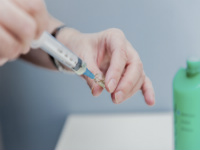Full article
A PDF of the full version of the article, published in Polish Archives of Internal Medicine, can be accessed free of charge here.
Abstract
Clostridium difficile infection (CDI) is one of the most commonly reported nosocomial pathogens in the United States and Europe, with recent CDI-associated mortality in the United States approaching 30,000 deaths annually. Antibiotics remain the preferred treatment for CDI; however, a minority of patients
experience numerous relapses and are treated with restoration of the bowel microbiota, termed fecal
microbiota transplantation (FMT).
FMT involves the introduction of a fecal suspension from a healthy donor into the gut of the infected patient
to cure the CDI and replace depleted components of the gut microbiota. FMT is particularly effective
and safe in curing CDI, using a colonoscope or enema to deliver 1 to 2 infusions. Given that 6,425 CDIs
were reported in Poland in 2014, practicing physicians should understand the benefits and limitations
of FMT in CDI as this novel therapy has rapidly advanced to the level of the “standard-of-care” status in
Australia, the United States, and many parts of Europe. FMT has been administered either as a suspension
in saline, a highly refined liquid product which can be frozen, as lyophilized powder in capsules,
and as an encapsulated spore preparation. The ultimate products to reach the market will be shaped by
the indications approved by regulatory bodies.
At present, the fecal suspension in saline remains the
treatment of choice to terminate relapsing and severe CDI, which we will review here.
The use of FMT for non-CDI indications, such as inflammatory bowel disease and irritable bowel syndrome,
is likely to increase. At present, these indications remain in the domain of research institutions.
 English
English
 Español
Español
 українська
українська







